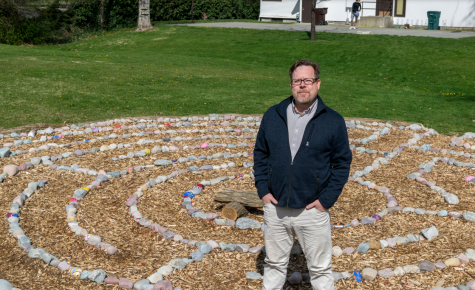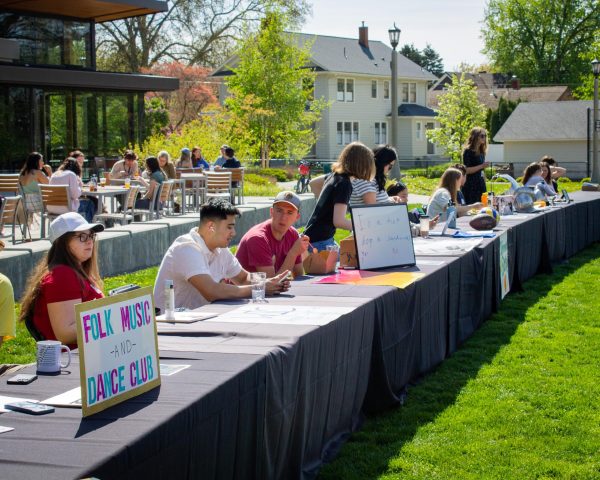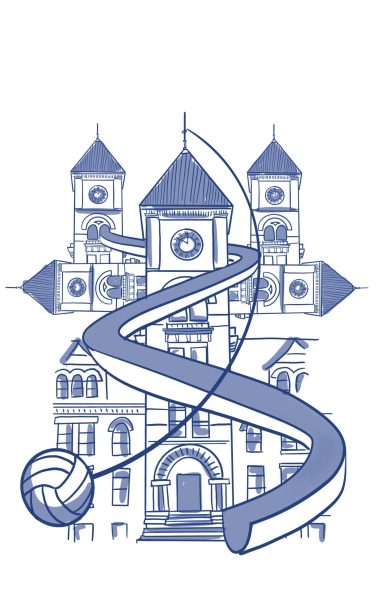Students find community in faith
April 15, 2021
For Whitman students, religion is often an unusual and even rare subject of conversation. Most atheistic or agnostic students seem either disinterested or antagonistic towards religion. Because of this, religious life is hidden from the majority of students. But for students who are religious, the various faith-based organizations on campus, like Intervarsity Christian Fellowship, Kehilat Shalom and Muslim Student Association, can be helpful for forming and sharing a communal identity with other students.
Adam Kirtley, Whitman’s Interfaith Chaplain, shares the shock factor from both religious and non-religious perspectives of the statistics of religion practiced at Whitman.

“When [students] hear that 30-35% enter with some sort of religious identity, I ask people, ‘Are you surprised that a third of the students have a religious background? Some people are shocked that it’s that high, that there’s that many and some people are shocked that it’s that few… That number would probably be double in a lot of other places, but the Pacific Northwest is known as being a particularly non-religious region of the country,” Kirtley said.
Religion can be an opportunity for students to share their identity with others on campus, but many students have found that campus isn’t always an accepting place in which to practice their faith. Senior Phyllis Pawa, former president of Kehilat Shalom (previously known as Hillel Shalom), believes acceptance at Whitman should come in the form of mental and physical consideration for religious students.
“A lot of my work has been around making being religious at Whitman not only an acceptable practice but something we can celebrate. That’s hard at a school that doesn’t leave physical space for religious students,” Pawa said.
However, for many, part of practicing a religion includes finding others that share the faith and being able to form a community around this. Community helps students to find a home through a piece of their identity. Sophomore Myan Sudharsanan has had the opportunity to find community both in and outside of Whitman.
“I have gotten in touch with a few Hindu families in the Walla Walla area, and while they’re not Brahmans like myself, I still took time to visit their services during my freshman year when there was no [pandemic],” Sudharsanan said.
Whitman’s religious groups try to encourage curiosity among students regardless of their religious beliefs. Although religious practices are often concealed on campus, there is a need for it to be acknowledged both to invite others in and continue providing a community for religious students. However, Pawa was uncertain about seeking out the Jewish community at first.
“It certainly isn’t easy [for students] being religious at Whitman. I’ve always found that people aren’t religious here or pretend not to be in a way that actually closes it off to people that are religious. So I was very nervous to join the religious group because I felt that I was going to be judged differently from the normative Whitman student.”
However, Pawa eventually joined Kehilat Shalom.
“I’m really glad I ignored that because I think it helped me really find who I am even in that and then develop my own practices,” Pawa said.
Practicing students say they rarely bring up their faith out of fear of disrespect, misunderstanding or discomfort. When it comes to sharing his faith, junior Michael Chang has felt a mixture of positivity and caution.
“I’ve been lucky that they’re [non-religious peers] open to that kind of conversation and it’s a lot easier to talk about it. I get a lot of value from them … I wouldn’t say I’m comfortable just walking up to a random student and striking up a conversation about religion unless I knew them at least a little bit,” Chang said.
Pawa told The Wire about how academics can be stifling to the religious identities of students.
“I’ve had a professor tell me to leave my religion outside of the classroom and I have an issue with that not because I aim to proselytize, but because it’s part of my identity. Just like I can’t really leave the experiences I’ve had in my body as a woman, I can’t really leave the experiences I’ve had in my body as a Jewish person,” Pawa said.
In other instances, religious students are encouraged to bring their faith and perspective together to educate the community. Sudharsanan has contributed to Whitman’s music culture with his system of music related to his practice.
“I’m actually a South Indian classical musician, I’m a percussionist. I have worked with the music department extensively, and this instrument that I play is a classical instrument that is, the system of music is called Carnatic music, a devotional gift to the Hindu gods,” Sudharsanan said. “While my goal introducing it to the music department was not to present this religious aspect of it, they began to understand it over time as I explained it to them, and eventually, they allowed me the opportunity to perform with the jazz ensemble. I was able to spread some awareness about the instrument and its connection to Hinduism.”
Some students believe the academic side of Whitman should be more supportive of religious identities as well as challenge the beliefs of students in the same way that non-religious students are invited to question their biases. Kirtley believes that Whitman is responsible for helping students to balance their identity and explore different perspectives.

“I think that every student at Whitman should be engaging and interrogating all of the messages and beliefs that they acquired before they came to Whitman. And it very well may be that many of those beliefs are reaffirmed after they have interrogated them. But if we don’t create a space where people are invited to do that, encouraged to interrogate what they thought they knew before they arrived, then the college has failed in its mission. And I’ve got to work hard to get the college to get out of the way and to support those religious identities. They are cherished and sacred parts of people’s lives,” Kirtley said.
Despite academic or social challenges, Whitman can still offer community to religious students through involvement in a religious group as well as engagement with peers that are not religious. Chang has felt at home through practicing religion and finding others who are welcoming.
“For me, it [religion] is a pretty big part [of feeling at home]. I guess it could be classified as hard-core Christian, but it is a pretty important thing to me, so much that it’s ingrained into [my] routine. As far as community, I think the most engagement I have is with other Christians on campus. The biggest thing for me is just having that community… and it doesn’t even have to be related to the religion, it’s just having that group is really nice,” Chang said.
Sudharsanan also believes that a more religiously diverse community at Whitman would benefit further acceptance of students of faith.
“I think part of the reason why there are not too many Hindu students who are religious about their faith, a lot of people who fit that criteria of someone who cares about their faith a lot and takes pride in it, don’t really fit the mold of a Whitman student very well. And I think that’s not an issue on their part, it’s more of an issue of Whitman not reaching out to those people, not giving a chance to those people,” Sudharsanan said. “Whitman preaches diversity and a diverse perspective on personalities and in order to achieve that I think this would be a great step in that direction rather than just saying that over and over again.”
Kirtley believes that ignoring religion on campus reinforces a narrative that does not accurately represent the greater Whitman community.
“Whitman is a small enough place that certain narratives can get advanced over the years and they take on a life of their own. These particular narratives take on a life of their own that isn’t necessarily reflected in reality. One of those narratives is, ‘No one at Whitman is religious’… but the reality of it is that there is a strong religious identity from a lot of students in our community,” Kirtley said. “That is my hope, that we begin to complicate and dismantle those under nuanced narratives that say that Whitman is not a place for religion.”








